Managed fund investment performance update: May 2025
Last year, global share markets — particularly in the United States — soared to record levels, powered by enthusiasm for Artificial Intelligence and cutting-edge technology developments. Investor optimism was high, and tech stocks, especially those tied to AI, were the primary drivers of this growth.
Fast forward to 2025, and the environment has shifted. Since reaching a peak in mid-February, equity markets in both Australia and the US have experienced heightened volatility and notable declines, culminating in a sharp downturn in early April.
What’s behind the turbulence? Much of it can be traced back to the cooling enthusiasm for the large US "mega tech" companies. As the initial excitement around AI investments faded, investors started reassessing whether the heavy spending on this emerging technology would translate into tangible returns — leading to widespread market jitters.
Late last year, we shared our cautious stance on investing in companies with extremely high valuations. Our commitment to disciplined pricing means that, during market corrections, our holdings can be better insulated — simply because they haven’t been priced at unrealistic levels to begin with.
What happened in April?
The sharp sell-off in April was largely a reaction to new trade policies announced by US President Donald Trump. The introduction of significant tariffs and trade restrictions sent shockwaves through global markets, with fears that reduced trade could slow economic growth and erode corporate earnings. In response, many investors moved quickly to reduce exposure to equities.
While unsettling, it’s important to remember that corrections like these are part of long-term investing. We've seen similar episodes — from the early days of the COVID-19 pandemic to the Global Financial Crisis in 2008 and even the 1987 crash. In each case, markets eventually recovered, rewarding investors who stayed the course.
Our strategy moving forward
Navigating this period of volatility, we remain focused on fundamentals: paying fair prices for quality assets and staying alert to new investment opportunities as they arise. Our diversified approach — investing across different asset classes and strategies — is designed to help manage risks and position your portfolio for long-term success.
| 1 year (%) | 7 years (%) | 10 years (%) | |
|---|---|---|---|
|
Australian Shares Fund (Wholesale)
Benchmark: 65% ASX 100 / 35% ASX Small Ordinaries Objective horizon: 7 years |
4
|
9
|
9.2 |
|
Emerging Companies Fund (Wholesale)
Benchmark: S&P/ASX Small Industrials Objective horizon: 7 years |
4.6
|
10.5
|
N/A
|
|
Balanced Fund* (Wholesale)
Benchmark: SAA weighted benchmark Objective horizon: 10 years |
5.2 |
8.4 |
7.4 |
|
Diversified Shares Fund (Wholesale)
Benchmark: 75% S&P/ASX 300 /25% MSCI World ex Aus Objective horizon: 7 years |
4.4 |
12.7 |
9.2 |
*Click through for remaining Multi-Asset/diversified fund performance. Fund returns are wholesale net of fees and tax. Benchmarks are gross. Returns are for the periods outlined to the end of March 31, 2025. Past performance is not a reliable indicator of future performance.
See performance for all managed fund options
Finding silver linings
Market downturns aren’t always a negative for investors — especially for those taking a long-term view and able to see short-term share price declines in a broader context.
In the current environment, we’ve been able to act quickly to find high-quality companies and projects at more attractive prices. Volatility often creates opportunity, and recently we have focused on making new investments or adding to existing holdings where we see strong long-term value.
There have also been some clear positives for our investment approach during this period of uncertainty.
For example, fashion companies — part of the "consumer discretionary" sector — saw steeper declines than the broader market during the April sell-off. These companies are particularly sensitive to changes in global trade conditions, which were negatively impacted by President Trump’s newly announced tariffs. Thanks to our Ethical Charter, which directs us away from companies in this sector, our portfolios were less exposed to these declines, helping our returns relative to the overall market.
Similarly, fears of a global economic slowdown are expected to dampen energy demand, particularly for oil and fossil fuels. Because our Ethical Charter also excludes investments in these areas, this has further benefited our portfolios during the market adjustment.
Market ups and downs are a normal part of investing. Investors who sell after steep market declines risk "locking in" losses and missing out on potential recoveries.

The dips and unpredictability can mostly be linked back to US “mega tech” AI-themed companies losing their shine, as investors started to wonder whether they were likely to see returns from all the money being spent on propelling this technology forward.
Australian Ethical Investment Ltd (ABN 47 003 188 930, AFSL 229949) is the Responsible Entity of the Australian Ethical managed funds. Interests in the Australian Ethical Retail Superannuation Fund (ABN 49 633 667 743, USI AET0100AU) are offered by Australian Ethical Investment Ltd (ABN 47 003 188 930, AFSL 229949) and issued by the Trustee of the Fund, Australian Ethical Superannuation Pty Ltd (ABN 43 079 259 733, RSE L0001441, AFSL 526 055).
This information is of a general nature and is not intended to provide you with financial advice or take into account your personal objectives, financial situation or needs.
You may wish to seek financial advice from an authorised financial adviser before making an investment decision. Past performance is not a reliable indicator of future performance. Please read the Financial Services Guide, relevant product disclosure statement (PDS) and Target Market Determination (TMD) available on our website before making any decision about what is appropriate for you.
Past performance is not a reliable indicator of future performance.
Ratings or investment returns are only one factor you should consider when deciding how to invest. Remember, superannuation is generally a long-term investment.
Investing ethically and sustainably means that the investment universe will generally be more limited than non-ethical, non-sustainable portfolios in similar asset classes. This means that the portfolio(s) may not have exposure to specific assets which over or underperform over the investment cycle, and so the returns and volatility of the portfolio(s) may be higher or lower than non-ethical, non-sustainable portfolios over all investment time frames.



